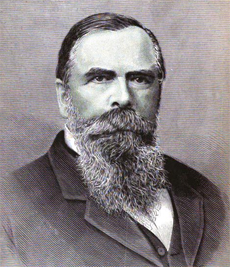Search
John Bidwell

Born - Died
John Bidwell was an American politician and pioneer.
Bidwell was born in Chautauqua County, New York on August 5th, 1819. In 1829, he moved with his family to Erie, Pennsylvania. Finally the family settled in Ashtabula County, Ohio. At the age of 17, he attended the Kingsville Academy. A short time later he became it's principal.
At the age of 21, he became one of the first emigrants to California. When he arrived in California, John Sutter hired him as his business manager. Shortly after gold was discovered at Sutter's Mill. Bidwell capitalized on the California Gold Rush and bought up large areas of land. He found gold in the Feather River and created a productive claim.
Bidwell attained the rank of major while fighting in the Mexican-American War.
In 1849, he served in the California Senate. He supervised the California census in 1850 and 1860. Also in 1860, he was a delegate to the Democratic National Convention.
After the American Civil War broke out, he rejoined the military, this time serving as a brigadier general for the California Militia. In 1864, he was a delegate at the Republican National Convention. He was elected as a Republican to the United States Congress from 1865 to 1867.
In 1868, he wed Annie Kennedy. In attendance at their wedding, President Andrew Johnson and future President Ulysses S. Grant. Once the couple returned to California they entertained a variety of guests at their mansion including President Rutherford B. Hayes and Susan B. Anthony. Annie was active in the Suffragette movement and the Prohibitionist movement. Bidwell followed her lead and campaigned for both causes.
In 1892, he was the Prohibition Candidate for President of the United States. He achieved the highest number of votes for the Prohibition party in any national election, getting 2.3% of the vote.
Bidwell passed away on April 4th, 1900.
Bidwell was a member of San Jose Lodge No. 10. Later he affiliated with Chico Lodge No. 111. Bidwell's signature still appears in the by-laws of Chico Lodge. In 1867, he sent a letter to his, soon to be wife Annie telling her he felt any allegiance to the fraternity was "pointless".
This article provided by Brother Eric C. Steele.